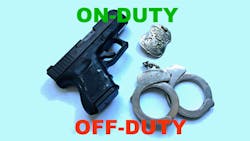Off-duty . . . on-duty . . . is there really a difference? Some departments send an ambiguous message to their officers so that one is never certain about just how much we should interject ourselves into a situation. Some departments have policies stating an officer must be “armed and on-duty” 24 hours a day. Other departments leave carrying a firearm off-duty up to the discretion of the individual officer. But does the mere fact of carrying a firearm off-duty mean you should still act in the capacity of a police officer? Not necessarily.
During the last few years we’ve seen an increase in violent crime, particularly those involving firearms. Shootings at malls, schools, nightclubs, and other public venues are on the rise. That said, it makes sense that it’s likely an off-duty officer may be present at one of these occurrences.
Whether or not an officer thinks he should involve himself in an off-duty incident, there are three things he should always carry—firearm, handcuffs, and badge. These three items are the meat and potatoes of police work—one without the other causes us to be less than fully effective. Would you go on-duty without one of these items? I hope not, for you would quickly learn the folly of your actions. So how does not carrying these items off-duty differ from carrying them on-duty, particularly if you have to become involved?
Question: How often do we shoot people? For many of us the answer is never. Compare that to how often we put our hands on people, or direct them to submit to our authority, and you have a huge disparity in numbers. That said, what good is having that gun without a pair of cuffs? Criminals today know we’re not going to shoot them unless lives are at risk, so without cuffing them how do we stop or restrain them? Just because you announce your office to someone doesn’t mean they will submit to your authority. Handcuffs become an issue here, on-duty personnel may take a long time arriving. What do we do in the meantime—hold them at gunpoint? Thugs know better.
And what about the badge issue? It should go without saying that the gun and badge are synergistic—they go together, one has little impact without the other. But an officer cannot have that badge tucked away in a sock or purse. Ideally it should be in a belt clip worn right next to the gun. Placed in that manner it causes us to be readily identifiable by either the public or other law enforcement. Another excellent way to display the badge is on a chain worn around the neck. It can be tucked inside a shirt or blouse and easily displayed when the time dictates. Having the badge prominently displayed can ultimately save your life.
And while we’re on the topic of carrying off-duty, tucking the gun in one’s waistband or pocket is asking for trouble. I have been guilty of doing this in the past, but that still doesn’t make it right. If you do decide to get involved and end up chasing someone or tussling with them, your weapon must be secure. One of two things will probably happen: you will either have that weapon fall out of your pants during the chase and/or struggle, or you will have it taken from you. Neither result is desirable.
The big question now becomes, "When is it appropriate to get involved?" There is no clear answer except to say that you are compelled to act when lives are on the line. If you decide not to act in a situation where deadly force may be applied, I submit that you are derelict in your duty as a police officer. Anything less than that threshold, you will have to be your own judge as to the level of involvement you choose. We know that in some instances it is better to be a great witness. Some of those situations are:
- Anytime family members are with us
- Whenever we fail to bring the proper equipment
- When involving ourselves in a situation would put us or another officer at risk.
Knowing when to take police action off-duty is learned behavior. It should be discussed in every basic police academy, as well as refreshed at in-services. Despite addressing this dangerous practice, we still have officers who think it’s their responsibility to act on anything and everything that occurs in their presence. It’s not—chill out and let your colleagues handle it. When an on-duty officer has to take time dealing with an overzealous cop, it takes his focus off the task. That can have deadly consequences.
So cherish your off-duty time. Spend it with your loved ones, exercise, catch up on chores, go to school, or get involved with a hobby. Whatever you choose to do off-duty, ensure that you leave your work at the office. Police work is stressful enough without burdening yourself with getting involved off-duty as well. If you are off-duty-act like it. Enjoy life.
Stay safe brothers and sisters!
About the Author
John Wills
John M. Wills is a former Chicago police officer and retired FBI agent. He is a freelance writer and award-winning author in a variety of genres, including novels, short stories and poetry. John also writes book reviews for the New York Journal of Books, and is a member of the National Book Critics Circle. His new book, The Year Without Christmas, is available now. Visit John at: www.johnmwills.com.

